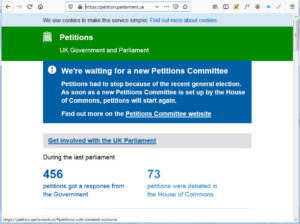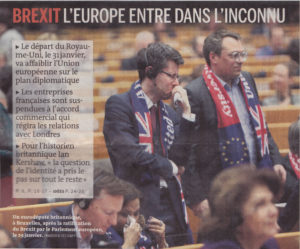As it happens I was in London on “Brexit Day” (though thought better of going near Parliament Square in the evening). I saw someone selling The Big Issue, with a front cover asking “Would the Kindertransport be welcomed now”. Yes, that is a reference to the Dubs amendment, rejected by parliament, that would have offered protection to unaccompanied children. But the xenophobia unleashed by Brexit is ugly. The stories of people who have lived in the UK for years being denied settled status brings up unsettling associations with the treatment of minorities — most especially Jewish people — in Hitler’s Germany. It’s easy to say that is “totally different”. But is it?
On a news stand I saw a copy of Le Monde. The headline “Brexit: L’Europe entre dans l’inconnu” (Brexit: Europe enters the unknown) fits with the front cover of The Economist — a ship captioned “into the unknown“. That’s a more realistic assessment than None of Boris Johnson’s crazy optimism.
A google search for something else produced a string of responses around “British Empire 2.0”. These are newspaper responses highlighting the nostalgic nonsense behind Brexit. It was topped by one in The Guardian entitled “Empire 2.0: the fantasy that’s fuelling Tory divisions on Brexit” Yet in this day and age, to ignore the destructive side of the British Empire is somewhere between historical illiteracy and wilful ignorance.
I mentioned Chistopher Wylie’s book Mindf*ck, inside Cambridge Analytica’s plot to break the world to someone. The book is a devastating exposé of Cambridge Analytica’s work undermining faith in electoral processes and using the tools psychological warfare to find people susceptible to their messaging. This isn’t about democracy. It is about the techniques that could be used in war to undermine and manipulate people. Among the comments that stand out in my memory are the tricks used to persuade people that the EU is racist (because most of the EU migrants to the UK are white), and to persuade people that “the economy” is about bankers and rich people, not ordinary voters, which explains people’s willingness to ignore the economic implications. But psychological warfare isn’t just about persuading people. It is about spreading disinformation in a way that undermines trust in democracy, and plays with people’s minds. That mobilises anxiety and minimises reason. No wonder the arguments from Leave supporters have been so simple.
We’d agreed to send an email to members of Huntingdonshire Liberal Democrats, which references to “Profound sadness” and “deep-felt grief”. Talking about it with our Chair, I found myself fighting back tears. The emotions are real.

I looked on the Parliament petitions web site to see if there was a petition being run to rejoin the EU. It has a notice saying that “Petitions had to stop because of the recent general election. As soon as a new Petitions Committee is set up by the House of Commons, petitions will start again.” So… it’s possible to “deliver Brexit” but not to set up a committee? Given the success of the last petition to stop Brexit, this stinks — it sounds very much like a government trying to avoid enabling a petition that would show the depth of opposition to Brexit.
Come to that, the report into Russian interference in the referendum has still not been released. The last Chair of the Intelligence Select Committee, Dominic Grieve, described Boris Johnson’s delaying of this until after the election as “jaw-dropping”. If it doesn’t cast doubt on the integrity of the referendum, why did Johnson want to delay it (and get a General Election in before it came out). Johnson can’t delay indefinitely, but this needs a new Intelligence and Security Select Committee. That too hasn’t been appointed yet. So, it’s delayed until it is too late for a backlash to stop Brexit.
So, we have grief and horror at Brexit, and a government fiddling to stop opposition being expressed and to suppress information that would fuel that opposition. The word “undemocratic” comes to mind.
And the sadness… Yes, it is grief. Grief for all the cultural ties being damaged and the harm being done. More than that, it is grief at the co-operation being trashed. More than that, it is a recognition that playing with people’s minds is a dangerous game. It — illegitimately — manipulates them into voting against their interests. But it paralyses thinking. It’s the situation where a country becomes ripe for fascist thinking. This isn’t to accuse Boris Johnson and his circle of fascism — it is to accuse them of rashly opening the door to the madness the EU was set up to contain. It may be more irresponsible than malicious, but it is deeply dangerous.

It was a day of anger. Righteous anger. We are not giving in or going away. They should not have underestimated us.